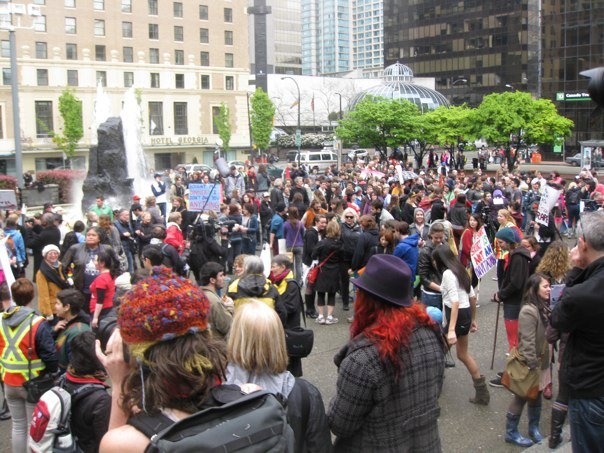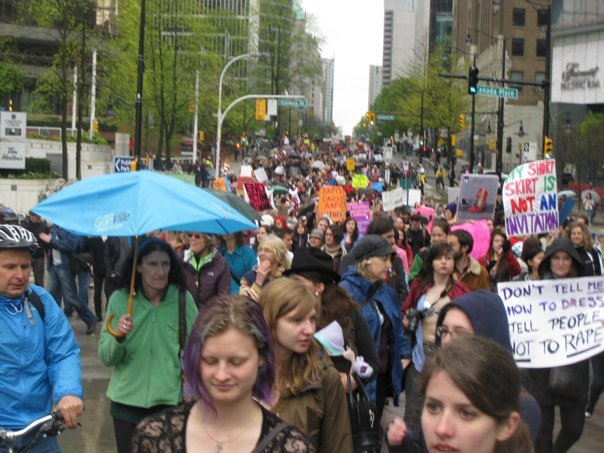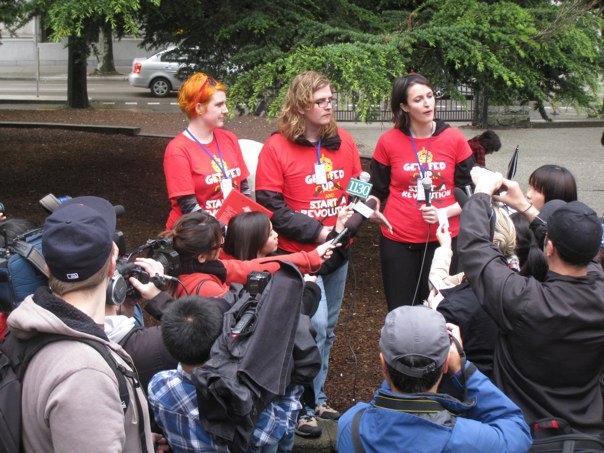In my earlier post about SlutWalk, I made reference to a blog post that called the white blindness prevalent in SlutWalk – the complete failure to recognize that slut is not only gendered but racialized as well. There’s a lot of really good stuff in there:
Had SlutWalk organizers considered New Orleans – or perhaps any city in the Northern Hemisphere where undocumented women possess a very real fear that a call to the police for any reason will result in her own deportation – they might have thought twice about sinking so much time and energy into their event. They might have had to listen to women of color, and actually involve them in visioning for what an equitable future would look like. Instead, they decided to celebrate a term not everyone is comfortable even saying.
…
There is no indication that SlutWalk will even strip the word “slut” from its hateful meaning. The n-word, for example, is still used to dehumanize black folks, regardless of how many black folks use it among themselves. Just moments before BART officer James Mehserle shot Oscar Grant to death in Oakland in 2009, video footage captured officers calling Grant a “bitch ass nigger.” It didn’t matter how many people claimed the n-word as theirs – it still marked the last hateful words Grant heard before a white officer violently killed him.
…
Whether white supremacist hegemony was SlutWalk’s intent or not is beyond my concern – because it has certainly been so in effect. This event will not stop the criminalization of black women in New Orleans, nor will it stop one woman from being potentially deported after she calls the police subsequent to being raped. SlutWalk completely ignores the way institutional violence is leveled against women of color. The event highlights its origins from a privileged position of relative power, replete with an entitlement of assumed safety that women of color would never even dream of. We do not come from communities in which it feels at all harmless to call ourselves “sluts.” Aside from that, our skin color, not our style of dress, often signifies slut-hood to the white gaze.
A common problem in discussions of minority groups is that it becomes too temptingly easy to focus on your own oppression and ignore the fact that some of your compatriots feel things quite a bit differently. It certainly doesn’t help when you are then accused of “hating” the majority group because you level reasonable criticisms at them (poke through the comments at the bottom of the link for examples of what I mean):
If you want to open space for a new dialogue, you need to take down the “white supremacist” nonsense from your article. This is such BS – you are being an enemy to ANYONE who wants to speak out against rape, regardless of what their color is. Oh, but that’s right, you don’t give a **** if white women get raped. They deserve it, right? Who the he** cares if THEY get raped – is that what you are trying to say?
That’s a direct quote from a race-baiting sock puppet that haunts the comments section.
Over at PoCO, much the same argument is being made:
I thought to myself, after hearing of SlutWalk, about how much language and empowerment is racialized. How would the Mexican-American mothers I know feel about their daughters calling themselves whores? Or the Black mothers of friends react to their daughters calling themselves sluts? Probably not well. Many communities of color have had growing movements against anti-woman language for good reason. For communities of color, even those who aren’t expressly political, there’s a visceral reaction to name-calling aimed at women of color, who are seemingly always the targets of names whose historical, cultural, social and political edge white women will never confront.
From ‘welfare queens‘ to ‘unwed mothers,’ images are almost always racial. As a Latino male, people who look like me (and Black men as well) are often the ones visualized when people think gender oppression. But white supremacy means Caucasians do not, for the most part, need to think about messaging regarding normalcy and deviance, or that people of color, especially women of color, have been subject to these issues all our lives. Historically, the masses of white women have not fought with women of color, but instead sided with white men in exchange for their own freedoms.
These are legitimate criticisms, not dismissals of the event as a whole. The point of such criticism is not to tear down the cause, but to expose some of the hypocrisy and unexplored biases and cognitive hiccups that might (and usually are) otherwise be ignored. Read the criticisms, learn from them, do better next time.
Like this article? Follow me on Twitter!



